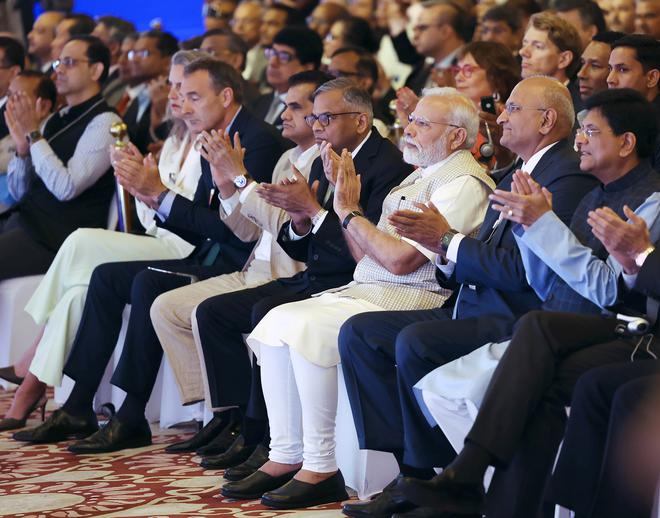Prime Minister Narendra Modi on August 27 cautioned global businesses against treating countries only as a market and urged them to move beyond their focus on bottomlines as a balance between producers and consumers’ interests is vital to sustain a profitable market.
Pointing to the “irreversible disruptions in the global supply chain” after the COVID-19 pandemic, Mr. Modi questioned the efficiency of such supply chains that failed to work when the world required it the most and presented India as a trustworthy solution to such disruptions that the world is dealing with today.
Addressing the closing session of the B20 India Summit, Mr. Modi mooted a reboot of the traditional “brand and sales” approach to business and must focus on improving the purchasing power of people, underlining that a “self-centric” approach will harm everyone.

“As a business, we also have to focus on creating an ecosystem that will benefit us in the long term. Now, due to the policies implemented by India in the past few years, 13.5 crore people have come out of poverty in just five years. These people are the new consumers. This neo middle class is also giving momentum to India’s growth,” the PM noted.
Treating other countries only as a market will not work and even harm producing countries sooner or later, Mr. Modi warned, stressing that the way forward is to make “everyone equal partners in this progress”.
Businesses, he said, should be more consumer-centric, whether the consumer is an individual or a country that is using global goods and services, and suggested an annual “International Consumer Care Day” that can enhance trust between producers and buyers.
While March 15 is designated as World Consumer Rights Day, the PM said: “When we talk about consumer rights, should not we also be mindful of consumer care as it will automatically take care of many consumer rights issues? We should definitely think about a system for ‘International Consumer Care Day’. Every year, can global businesses come together to pledge themselves for the good of the consumers and their markets?”
Terming the uneven availability of critical material and rare earth metals as a similar challenge, Mr. Modi said: “If those who have them do not look at them as global responsibility then it will promote a new model of colonialism.”
Linking the future of global growth to the future of business, Mr. Modi said that industry can transform potential into prosperity, obstacles into opportunitiesand aspirations into achievements. “Whether they are small or big, global or local, business can ensure progress for everyone,” he averred.
Just as people have become more conscious about their health after the pandemic, the Prime Minister said that businesses and society should analyse the impact of their decisions on the planet. The future of business and humanity will be decided by the answers to challenges such as climate change, energy crisis, food supply chain imbalance and cyber security, which will also have a big impact on business, he said.
Moreover, the proliferation of cryptocurrencies and the emergence of Artificial Intelligence (AI) pose fresh issues that could pose “potential disruptions in different sectors” and need an integrated approach with a global framework so that all stakeholders’ concerns are duly addressed, the Prime Minister pointed out.
Referring to the ethical considerations in AI such as algorithm bias and its impact on society, and the need to reskill people, Mr. Modi said: “Such issues have to be resolved together. Global business communities and governments will have to work together to ensure that Ethical AI expands.”







